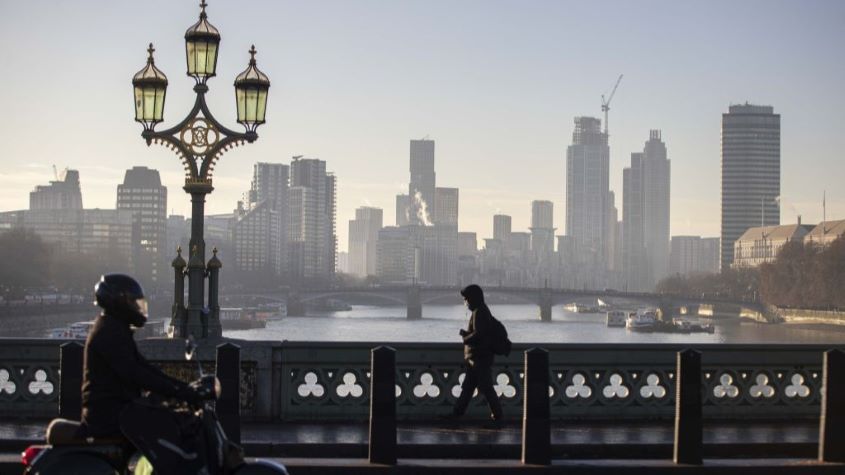When will UK inflation fall back to the BoE’s target?
Inflation has started to slow, but it could remain high for some time as underlying pressures build


Get the latest financial news, insights and expert analysis from our award-winning MoneyWeek team, to help you understand what really matters when it comes to your finances.
You are now subscribed
Your newsletter sign-up was successful
Want to add more newsletters?

Twice daily
MoneyWeek
Get the latest financial news, insights and expert analysis from our award-winning MoneyWeek team, to help you understand what really matters when it comes to your finances.

Four times a week
Look After My Bills
Sign up to our free money-saving newsletter, filled with the latest news and expert advice to help you find the best tips and deals for managing your bills. Start saving today!
The latest figures suggest UK inflation is starting to moderate, but investors shouldn’t celebrate just yet. Indeed, while the figures showed that CPI inflation slowed to 10.5% in December, from 10.7% in November, core inflation remains a severe problem.
The core inflation challenge
Inflation has spiked over the past year mainly due to higher energy prices, which have filtered through to every part of the global economy.
And while energy prices are now starting to come down (lower petrol prices were the main factor behind lower inflation in December), CPI is still miles away from the Bank of England’s (BoE) target inflation rate of 2% - a level not seen for over a year and a half.
MoneyWeek
Subscribe to MoneyWeek today and get your first six magazine issues absolutely FREE

Sign up to Money Morning
Don't miss the latest investment and personal finances news, market analysis, plus money-saving tips with our free twice-daily newsletter
Don't miss the latest investment and personal finances news, market analysis, plus money-saving tips with our free twice-daily newsletter
It could be harder to get inflation down to this level as higher prices become more ingrained in the economy.
Core inflation measures inflation excluding energy and food prices - the volatile components of the CPI measure. It’s designed to show the underlying inflation trends in the economy.
The Office for National Statistics (ONS) calls core inflation the more “durable” part of inflation because it tends to stick around longer than say shocks from energy prices.
Now, at 6.3% core inflation isn’t anywhere nearly as high as headline inflation. But - and here’s the problem - it has remained unchanged since November, staying firmly above 6% for the past six months.
Experts believe that this could be crucial in the BoE’s interest rate decisions.
Tommaso Aquilante, Associate Director of Economic Research at Dun & Bradstreet says “It is possible that a continued persistence of core inflation could result in the central bank continuing with aggressive tightening in order to bring price pressures down.”
Adding to this, Colleen McHugh, Chief Investment Officer at Wealthify says, “Core inflation is broken down between ‘core goods’ and ‘core services. From the BoE’s perspective, the key component of the inflation data to watch is the core services measure.” It has almost doubled over the past year, coming in at nearly 7% in December.
Will UK inflation follow US inflation lower?
Across the pond, there are some signs that policymakers are starting to win the battle against inflation.
Inflation in the US has started to moderate as energy prices have declined. Headline inflation has fallen to 6.5%, declining for six months straight after reaching a high of 9.1% in June 2022.
This is notable because it shows some of the global drivers behind rising prices are starting to moderate, such as high energy and food prices and transport costs, which will filter through to the UK.
However, there are also clear differences between the inflation challenge in the US and here in the UK.
To start with, the BoE and US Federal Reserve are taking different approaches. The central banks are raising interest rates to try and encourage consumers and businesses to save more and spend less. In theory, this should take money out of the economy and prevent prices from rising too fast.
The theory is the same on both sides of the Atlantic, but the approaches are different.
As McHugh says “The Fed was very aggressive in 2022, raising interest rates from 0-0.25% to 4.25%-4.5%, in order to get a handle on inflation. The BoE took slightly less aggressive steps to quell inflation, raising rates from 0.25% to 3.5%”.
The BoE has to be a bit more cautious as it’s fighting two different enemies, global factors and Brexit-specific factors.
The Resolution Foundation think tank reckons food prices rose 6% in 2020-21 due to new UK-EU trade barriers.
Another UK-specific concern as McHugh highlights is the fact the country is “suffering from worker shortages, leaving it on the hook for higher costs associated with potential wage growth.”
Wages grew at their fastest of 6.4% in more than 20 years (outside of the pandemic) for the September to November period, compared to the same time last year.
Private sector wages grew even faster, rising 7.2% overall and more than 10% in some sectors.
Wages are usually the biggest cost for businesses, so if they rise fast, they can put pressure on companies to raise the prices of their goods and services, feeding into core inflation.
The resulting higher inflation leads to demand for even higher wages, a difficult situation called the ‘wage-price spiral,’ and this is why high and persistent core inflation can be so challenging. Even if energy and food prices keep falling, the wage-price spiral can continue to drive prices higher.
What inflation means for you
Sticky core inflation indicates higher prices will continue to pierce consumers' pockets.
It also suggests the BoE will be forced to continue to raise interest rates further than other central banks as it tries to bring the CPI figure under control.
This in turn could mean even higher mortgage rates, which would hurt the already wounded UK property market. Housebuilder Persimmon estimates that some first-time home buyers are facing double the monthly cash costs they did last year.
Still, there could be a silver lining here. Lower property prices could improve affordability.
McHugh says “the likely slowdown that will ensue, will bring down house prices in the short term, and make them more affordable.” Indeed, the Office of Budget Responsibility (ORB) expects house prices to start falling this year, and this decline will only gather speed next year.
Savings rates have also started inching up. As the BoE continues to fight inflation, savers may continue to benefit from higher rates.
When will UK inflation fall?
“Inflation could potentially decline rapidly in the second quarter of 2023,” says Aquilante. In explaining why he adds “Aided by a mild winter, some of the key forces of inflation in 2022, such as energy prices, are abating significantly”.
McHugh echoes his views, saying that “Assuming we don’t have another flare-up in energy costs, the headline figures should trend lower to 6-7% by the summer.”
However other forecasters have said that it won’t decline to BoE’s target rate before late 2024 or early 2025. The BoE itself said in December 2022, that it will be “close to the 2% target in two years’ time”.
The key takeaway here is that even if it’s a while before inflation ceases to be a concern altogether, we should start to see some genuine relief much sooner - potentially even in a few months' time.
Get the latest financial news, insights and expert analysis from our award-winning MoneyWeek team, to help you understand what really matters when it comes to your finances.
Manika Premsingh is a macroeconomist and a stock analyst. Her investment research and writing is published on Seeking Alpha and in the past on The Motley Fool. She has also extensively provided research on both the economy and the stock markets for companies in investment management, stock broking and investment banking.
She is also a public speaker, having shared her views on the economy at various international forums. She has also been quoted for her views on the economy over the years in leading international publications.
Manika has a masters in economics and has done a certification programme in entrepreneurship, for which she received the Goldman Sachs 10,000 Women scholarship. Most recently she has completed a short course in sustainable development and is pursuing a certification in impact measurement & management for sustainable development goals.
-
 Japanese stocks rise on Takaichi’s snap election landslide
Japanese stocks rise on Takaichi’s snap election landslideJapan’s new prime minister Sanae Takaichi has won a landslide victory in a snap election, prompting optimism that her pro-growth agenda will benefit Japanese stocks
-
 Alphabet 'is planning a 100-year bond': would you back Google for 100 years?
Alphabet 'is planning a 100-year bond': would you back Google for 100 years?Google owner Alphabet is reported to be joining the rare century bond club
-
 UK wages grow at a record pace
UK wages grow at a record paceThe latest UK wages data will add pressure on the BoE to push interest rates even higher.
-
 Trapped in a time of zombie government
Trapped in a time of zombie governmentIt’s not just companies that are eking out an existence, says Max King. The state is in the twilight zone too.
-
 America is in deep denial over debt
America is in deep denial over debtThe downgrade in America’s credit rating was much criticised by the US government, says Alex Rankine. But was it a long time coming?
-
 UK economy avoids stagnation with surprise growth
UK economy avoids stagnation with surprise growthGross domestic product increased by 0.2% in the second quarter and by 0.5% in June
-
 Bank of England raises interest rates to 5.25%
Bank of England raises interest rates to 5.25%The Bank has hiked rates from 5% to 5.25%, marking the 14th increase in a row. We explain what it means for savers and homeowners - and whether more rate rises are on the horizon
-
 UK inflation remains at 8.7% ‒ what it means for your money
UK inflation remains at 8.7% ‒ what it means for your moneyInflation was unmoved at 8.7% in the 12 months to May. What does this ‘sticky’ rate of inflation mean for your money?
-
 Would a food price cap actually work?
Would a food price cap actually work?Analysis The government is discussing plans to cap the prices of essentials. But could this intervention do more harm than good?
-
 Is my pay keeping up with inflation?
Is my pay keeping up with inflation?Analysis High inflation means take home pay is being eroded in real terms. An online calculator reveals the pay rise you need to match the rising cost of living - and how much worse off you are without it.
